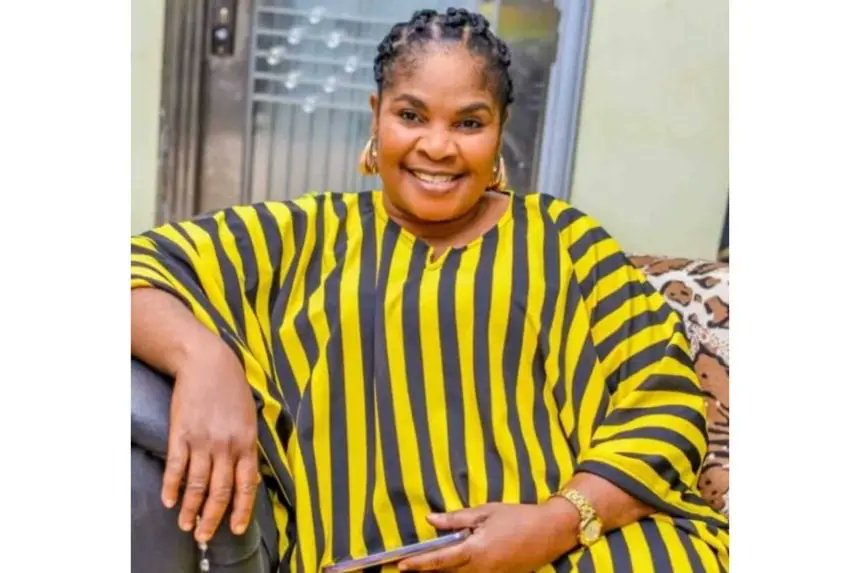
"I Was Blacklisted for Saying No" – Moji Afolayan Breaks Silence on 10-Year Nollywood Absence

In a revelation that has sent shockwaves across the Nigerian film industry, veteran actress Moji Afolayan has opened up about the real reason behind her extended absence from the big screen, citing a deeply troubling experience of being blacklisted by Nollywood marketers after rejecting sexual advances. The seasoned thespian, known for her iconic roles in Yoruba cinema, broke her silence in a candid conversation that is now prompting widespread reactions and renewed conversations around sexual harassment in Nollywood.
Moji Afolayan, daughter of legendary Nigerian actor and filmmaker Ade Love and sister to acclaimed director Kunle Afolayan, made her name through a series of compelling performances in both television and film. Despite hailing from a family deeply entrenched in the movie industry, her sudden and lengthy disappearance from mainstream productions had long puzzled fans and industry observers alike. Speculations had swirled for years, with many assuming she had either quietly retired or chosen to focus on family and personal business ventures. But as it turns out, the truth was far more sinister.
According to Moji, her fall from the public eye was not due to a lack of talent or relevance, but a calculated and coordinated punishment by influential marketers and power brokers in the Yoruba arm of Nollywood. She explained that she was deliberately sidelined after she boldly refused to compromise her morals and integrity. "I said no, and that cost me everything,” she revealed, her voice laden with a mix of pain and defiance. “I was blacklisted because I refused to sleep with marketers who thought that was the only way I could stay relevant in the industry.”
Moji Afolayan’s account paints a damning picture of a dark underbelly within the film sector, where gatekeepers wield their influence not merely based on talent or professionalism, but on a transactional culture that preys on women’s bodies. Her story echoes the accounts of several other female entertainers who have, over the years, hinted at or spoken out against similar coercive practices. The culture of silence, fear, and retaliation that surrounds these power dynamics has long ensured that many victims either leave the industry or suffer in silence.
“I wanted to act, I loved the art, and I believed in telling stories that matter. But I also knew my worth,” Moji said. “I knew I was not going to sleep my way to the top. It was heartbreaking to see people I once worked with turn their backs on me simply because I didn’t give in to their demands. They started saying I was difficult to work with, that I was proud, all because I said no to immorality.”
Her return to the spotlight has been met with overwhelming support, as fans and colleagues applaud her bravery and express outrage over the injustice she faced. Social media has erupted in a flurry of reactions since the news broke, with many users condemning the long-standing culture of exploitation in the industry and calling for systemic reforms that protect actors, especially women, from such abuses of power.
“This is exactly why many of our legends disappear and we don’t hear from them again,” wrote one Twitter user. “It’s not because they don’t want to work, but because the system is rigged against them if they won’t play dirty. Moji Afolayan deserves better.”
Others have used her story to highlight the urgent need for an actors’ union with real teeth, capable of confronting issues like sexual harassment, blacklisting, and unfair labor practices in the industry. Some also called on the leadership of the Association of Nigerian Theatre Arts Practitioners (ANTP) and other film guilds to investigate the matter and ensure justice is served.
Interestingly, Moji Afolayan did not name specific individuals in her account, a decision that some have interpreted as a cautious move to avoid legal retaliation or further blacklisting. However, she remained adamant about the reality of what she experienced. “I have nothing to gain by making this up,” she said. “I’m not the first, and sadly, I may not be the last. But if my voice helps just one girl stay true to herself and not be pressured, then it’s worth it.”
Her testimony also brings attention to the ongoing challenges of gender-based discrimination and exploitation in Nigeria’s creative industries. While Nollywood continues to enjoy massive global attention, including deals with international streaming platforms and growing recognition at film festivals, the internal rot—especially issues of abuse and gatekeeping—remains largely unaddressed.
As conversations continue to swell, many have begun demanding that brands, film houses, and streaming platforms take a more active role in ensuring ethical standards are upheld behind the scenes. There is a growing call for whistleblower protection policies and anonymous reporting mechanisms that would enable victims and witnesses to safely come forward.
Moji Afolayan’s resilience and refusal to be silenced is already sparking change. Younger actresses are beginning to share their own encounters, using the moment as an opportunity to draw a line in the sand and say "enough is enough." Some have even formed support groups and advocacy collectives to protect new talents entering the industry from falling into the same traps.
As for Moji, she says she’s ready to return—this time on her own terms. "I’m not afraid anymore. I may have been gone for a while, but I never stopped being an actor," she stated with quiet strength. "Now, I want to work with people who respect boundaries, who value professionalism, and who don’t see women as objects. That’s the Nollywood I want to be part of."
Her revelation is a powerful reminder that the true cost of integrity in some industries can be exile, but it is also proof that courage and authenticity eventually carve a path back. In speaking her truth, Moji Afolayan hasn’t just reclaimed her narrative—she’s ignited a fire that may finally force Nollywood to confront the demons lurking behind its glitz and glamour.


